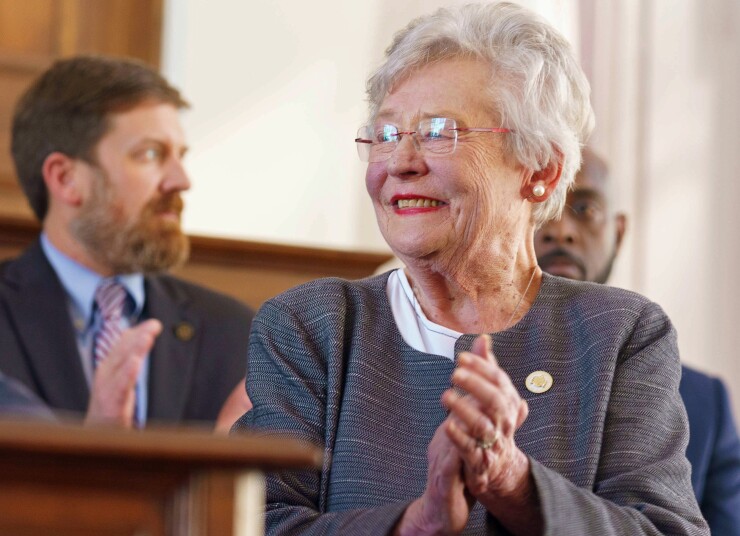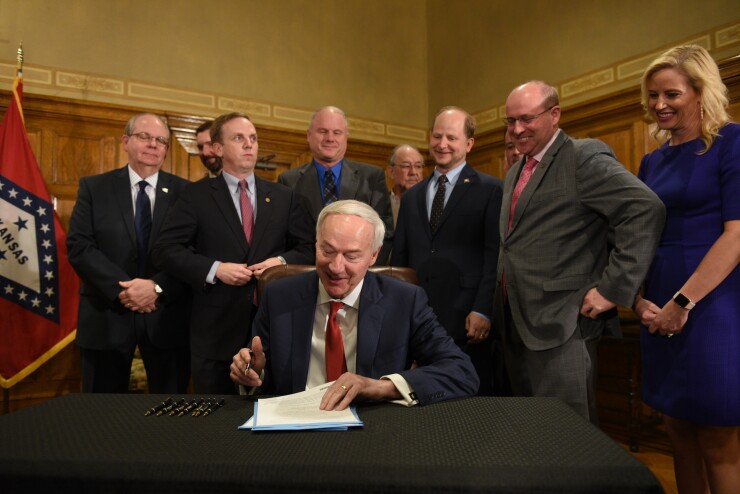With federal highway funds lagging, Alabama has joined a growing number of states greenlighting higher gas taxes to finance new and backlogged transportation projects.
Gov. Kay Ivey signed a bill into law March 12 phasing in a 10 cent per gallon fuel tax increase, while adding a $250 fee on annual license tax and registrations for electric cars and a $125 annual fee on hybrid vehicles.

Alabama’s fuel tax has been 18 cents per gallon since 1992. As of January, it was the fifth-lowest levy among the states, according to the Federation of Tax Administrators. The average state fuel tax is 27.3 cents.
“By passing the Rebuild Alabama Act, the Legislature has ensured Alabama’s infrastructure will be improved for generations to come,” Ivey said in a statement. “This wasn’t an easy task, but the men and women of the Legislature boldly came together to fix a decades old problem.”
Ivey is a Republican who won her first full term as governor in the November midterm election. She ascended to the governor’s office in April 2017 after Gov. Robert Bentley pleaded guilty to misdemeanor charges and resigned from office, rather than face impeachment proceedings.
Transportation funding legislation was introduced in the Alabama Legislature in four of the past five years, according to Alabama Department of Transportation spokesman Tony Harris.
ALDOT is responsible for 11,000 miles of state roads; 905 miles of interstates; and 5,752 bridges. In 2017, 969 bridges were functionally obsolete and 90 were structurally deficient.
“The new funding law allows for 50% of the new funding to be pledged toward bonds, but it’s too early to speculate whether we will exercise that option or use the new revenue in a pay-as-we-go manner,” Harris said.
Ivey told the GOP-led Legislature in her first State of the State address March 5, "enough is enough."
“Almost three decades have gone by, and Alabama has not made one change to our infrastructure funding," she said. "While our neighboring states are increasing their revenue for their transportation budgets, Alabama has not.”
Immediately after her speech, Ivey called lawmakers into a special session where they passed three bills at her behest. The measure increasing the state’s gas tax passed the Senate by a vote of 28-6; it passed the House by a vote of 85-20. Alabama Republicans have controlled both chambers since 2010, and hold veto-proof majorities.
At Ivey’s request, lawmakers also created the Joint Legislative Transportation Committee to scrutinize project spending, and authorized the Alabama Highway Finance Corp. to issue $150 million in bonds for the state’s share of enlarging the Mobile Ship Channel to serve larger cargo vessels traveling through the Panama Canal.
“We appreciate the leadership shown by Governor Ivey and members of the House and Senate to address Alabama’s infrastructure needs,” said ALDOT’s Harris. “This has the potential to provide long-term benefits for Alabama’s cities, counties and at the state level at a time when no new investment has been made in nearly three decades.”
The American Road & Transportation Builders Association’s Transportation Investment Advocacy Center said 27 states have raised or adjusted their gas taxes to increase transportation spending since 2013.
“It’s not political suicide to support such measures,” said ARTBA Chief Executive Officer Dave Bauer.
From 2013 to 2018, voters reelected 92% of nearly 1,900 state lawmakers who voted in favor of a gas tax increase and ran for reelection, he said.
“Support for lawmakers also persists across party lines,” Bauer said. “More than 94% of Republicans and 90% of Democrats were reelected.”
In the first two months of this year, lawmakers in 37 states introduced 185 bills to increase transportation funding, according to ARTBA’s Transportation Investment Advocacy Center, which tracks bills on its website.
The center said motor fuel taxes continue to be a popular method to raise new revenue, with 21 states proposing to increase one or more types of motor fuel tax to generate funds for transportation construction. Of those states, the center said 10 included altering or creating a variable-rate tax that fluctuates based on external factors such as the Consumer Price Index, average wholesale price of motor fuel, or other formulas.
While Alabama’s bill is not based on a variable-rate structure, the state tied future rate increases to an index. Beginning Oct. 1, 2023 and every other year thereafter, it will adjust its excise tax rate on gas and diesel fuel by the percentage change in the yearly average of the Federal Highway Administration’s National Highway Construction Cost Index.

ARTBA’s Transportation Investment Advocacy Center also said charging electric and hybrid vehicle fees is another trend continuing from previous years, with 16 states now considering such legislation.
“The states continue to show there is a more fiscally responsible way” to fund transportation needs, Bauer said. “By contrast, Congress and past administrations have relied on $140 billion in budget gimmicks to prop up the federal transportation programs.”
Federal investment in highways has historically been paid from the U.S. Department of Transportation's Highway Trust Fund, from a dedicated, user fee-funded source of money. However, the Trust Fund has been “teetering on the precipice of insolvency” because of limitations in its primary funding source, the federal motor fuels tax, according to the American Society of Civil Engineers.
The federal tax of 18.4 cents per gallon for gasoline and 24.4 cents for diesel has not been raised since 1993. Inflation has cut its purchasing power by 40%, the ASCE said.
Revenues from the Trust Fund have consistently fallen short of funding needs since 2001, according to a Dec. 13 Congressional Budget Office report on reducing the federal deficit.
Since 2008, federal lawmakers have addressed the funding shortfall by supplementing revenues dedicated to the Highway Trust Fund with several transfers, primarily from the Treasury's general fund, the CBO said. The report recommended eventually limiting highway and transit funding to expected revenues, a move that would eliminate future supplements from other funds.
Even with the transfers over the past decade, Moody's Investors Service says states have faced “stagnant” federal funding since 2012, so they are shouldering more of the infrastructure burden by raising state gas taxes. Michigan, Ohio and Wisconsin may follow Alabama’s example this year and hike fuel taxes, Moody’s said.
On March 12, Arkansas Republican Gov. Asa Hutchinson signed a bill imposing a new wholesale tax on fuel that raises gas prices by 3 cents a gallon and diesel by 6 cents a gallon in October. The state hasn’t increased those taxes since 1999.
The law includes new registration fees on electric and hybrid vehicles, as well as dedicated casino revenue, and is expected to provide the state an additional $95 million annually.
Hutchinson also commended legislators for passing his plan to allow voters to weigh in an amendment in 2020 that would extend a 1/2-cent sales tax indefinitely. If passed, it’s expected to produce $205 million a year for the state’s highways and bridges.
In Missouri, which has the fourth-lowest gas tax at 17.3 cents a gallon, new funding has proved elusive. Voters in November rejected a measure to increase the motor fuel tax by 10 cents per gallon.
When Alabama’s gas tax increase is fully implemented, Moody’s said it’s expected to raise $320 million annually for roads, bridges and other transportation infrastructure.
The phased plan requires a six-cent per gallon increase in gas and diesel excise taxes starting Aug. 31, 2019, followed by a two-cent increase in October 2020, and a third two-cent increase in October 2021.
While ALDOT will receive 66.67% of the increase for transportation improvements, a portion of the tax will secure bonds for Port of Mobile harbor improvements, and a portion of tax proceeds will be sent to cities and counties for their road programs.
“The tax hike will help offset past infrastructure investment shortfalls and unlock federal grants for port improvement,” Moody’s analysts said in a March 15 report. “The revenue boost is credit positive for the state, the Alabama State Port Authority, which owns and operates the Port of Mobile, and the Mobile region.”
The ship channel deepening will accommodate the “post-Panamax” class of freight ships and make the port more competitive, they said, adding that it could attract more logistics and manufacturing operations to the region, and is credit positive for Mobile and Mobile County.

The planned $150 million bond issue for the port project is expected to draw down about $250 million in federal matching funds.
Alabama had $673.6 million of outstanding general obligation bonds as of Sept. 30, 2017. The debt is rated AA-plus by Fitch Ratings, Aa1 by Moody's Investors Service, and AA by S&P Global Ratings.
According to Harris, ALDOT estimates its road and bridge needs to be as high as $10 billion.
The bill signed March 12 will direct the new gas tax funds to congestion and economic development needs at the state level, he said.
A small fund will be established to financing charging stations for battery electric vehicles, which he said is a significant step since those vehicles will be a growing part of the overall fleet on the road throughout the country.
According to a February report by the national transportation research group TRIP, only eight other states have gone as long as Alabama without an increase in gas taxes.
When adjusted for inflation, the TRIP report said the Alabama’s 18 cent a gallon fuel tax collects half of what it did in the early 1990s.
“An increasingly large share of ALDOT’s budget has been devoted to preserving the existing system of roads and bridges, leaving only $150 million available each year for new projects that would address congestion or expand the system to accommodate population and travel growth and promote economic development,” the report said.





